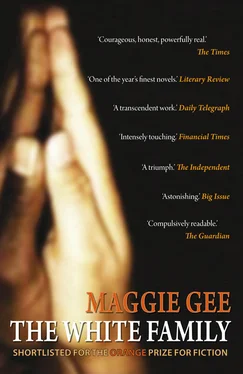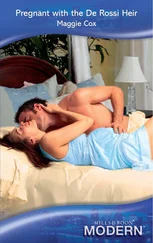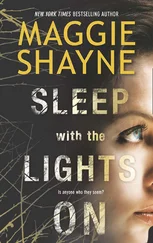(Will Shirley forgive him … when she knows he’s dying? The final lap. The final slope.)
It was sinking in in a different way from the conversation she had had with the doctor. On her own, it had all seemed dream-like, wrong.
But as soon as I saw his face today. As soon as our eyes met, we knew. We shared it, didn’t we? We shared the fear. And after that it will always be true –
May pushed it away. She could not bear it.
It didn’t do to dwell on the bad things, did it?
My father was sometimes very sweet to me. Softer on me than all the others, my mother told me, when she was dying. I was the youngest, his baby girl, and he loved me helping him in the shop, and was proud of me for being clever at school, though it never occurred to him I could go further. Of course it didn’t; he had raised thirteen, and he’d paid for the boys’ apprenticeships, so the girls had to marry, and that was that, yet he wasn’t happy about losing me to Alfred.
I hear him still. Angry, cold. He read all the papers, he had opinions, he’d hoped his daughter would find someone better. I cried when I told him. I knew Alfred wouldn’t suit.
Yet he is a better man than my father .
May held her face on red alert, smile against sorrow, smile at the world, an effort of will all down the ward.
Halfway down the stairs, which were cold grey stone, she found that she had sunk to her knees, on the first-floor landing, clutching the wall, hands held flat against cracked cold plaster. Tears came flooding down her cheeks.
She didn’t care what people thought. She — didn’t give a curse about her father. Damn him, damn him, we hated him.
But I can’t go and sit in the café like this. I can’t go and sit there with everyone gawping –
So perhaps she did still care, a little. Scrubbing her handkerchief over her face. She had never worn make-up, and now she never would.
(Will anyone ever think me pretty again? No one could be as blind as Alfred. I asked him a few weeks ago if he thought that film star Sharon Stone was pretty. We were watching her in a telly thing. He said, ‘Not half so pretty as you. Anyway, she’s a bit past it, isn’t she?’ — Sharon Stone’s thirty years younger than me!)
His kind of love. His kind of fondness. He was slow with words, but his eyes said it, and the way he patted me, and held my hand, and the way he looked when I wore the blue dress he likes so much, that matches my eyes … I never doubted that he loved me.
How many people can say as much?
It can’t be over. Alfred, Alfred .
She had wandered down the steps to the corner of the corridor that would have taken her down to the café. She stood there, sniffing and trying to breathe normally, clutching her wet hanky in her hand so tight that by the time she noticed it her fingers were numb.
A glass door led out into a little wild garden in the middle of the block. It would be locked, of course; it was a rule of life that all doors were locked, the ones you wanted to go through, at any rate. She turned the handle; it grated, refused. She started to cry again with frustration. Oh all her life the doors had been locked, her mother was weeping, May could never not hear it, her father was storming, she couldn’t get away, and then there was Alfred, shouting at table when she’d forced herself to make a nice lunch, and the children screaming when she tried to read, or Dirk, once, sobbing in that animal way because she had forgotten his birthday (but she’d had Asian flu, she’d been in bed, Dirk’s grief wasn’t reasonable, was it? No) –
She had never been able to slip out into the open, the quiet, clear space where happiness was. Not joy so much as an end to sorrow, a rest from anger and fear and resentment.
She pushed, a last angry, hopeful little push –
The door opened, and she was in the garden.
‘I went in the Park a few days ago,’ said Thomas. ‘I wanted to tell you that everything was ship-shape. Bulbs looking good. Willow turning yellow.’
‘Was the mesh cover over the pond?’ Alfred asked, anxious, focusing.
‘Oh yes,’ said Thomas. ‘That was all fine.’ (He hadn’t looked; he hadn’t noticed, distracted by the woman stealing bulbs.)
‘Otherwise it gets choked up with leaves … The teenagers. They take it off. If no one stops them. Then they throw things in the water.’
‘No, it was fine, honestly.’ (Darren had said: ‘I’m not bloody fine.’ And there had been the van with the chap from the council, the one who had spoken slightingly of Alfred.) ‘Everything was fine. Don’t worry.’
‘That pond … It’s a special place, that pond.’
Alfred saw it almost hourly still in the hospital, a picture window in the ward’s dull paint. It was a water-lily pond, with fat Koi carp winding in and out of the lily roots, leaves like green plates, reflected clouds. Behind it a terraced rockery with bonsai trees and dwarf rhododendrons. Flanking the rockery, dark cypresses, a magnolia tree which was one of Alfred’s favourites, and the trailing yellow of the tall weeping willow. Once there had been two, but one was cracked apart in the great storm of 1987, and the head gardener had wanted to save it, but the council decreed it had to come down, Health and Safety, rules and regulations, it was simpler and cheaper to take it down, though it would take a hundred years to grow another one.
‘I count the beginning of spring from that pond. Every March for the last ten years or so a pair of ducks have come and settled there. They only stay a couple of weeks but I always say to myself, spring’s here. One year they raised a brood on the pond. I had to stop the children chasing the ducklings. Lovely little things. Like a picture in a book. Comic, really. Going too fast. Always falling over. Just like kids … You don’t have children, do you Thomas?’
‘No,’ said Thomas. ‘I’d like to, one day.’
‘Don’t leave it too late. But of course you’ve got your job. You’ve got your library to think about.’ Alfred was afraid of having hurt Thomas’s feelings. All men wanted children, didn’t they? (And then once they’d got them, they longed to escape. From the mess and the fuss and the bickering.) So he added, ‘You’ve got to keep the books coming, too. May looks forward to you writing another one.’
‘That’s very kind of her,’ said Thomas. He blushed to think of May reading it. He’d tried to explain the title, once, but she’d patted his hand and said ‘not to worry.’ An old woman screamed, suddenly, painfully, far down the ward, too far to see, behind one of the drawn green curtains, and twenty heads looked up, nervous.
Pamela had made it back to her bed. She collapsed on to it, pulled herself up, then swung up her legs, one by one, an endless process of sighing effort, but once she was settled, hands clutching her bedhead, she turned on Alfred a glittering smile. Very brightly coloured — a touch on the puce side. She had taken a detour to do her make-up.
‘Helloo there, Alfred. Is that the famous son?’
‘Wrong again,’ he said, and winked at her, surprising himself with this moment of gaiety. ‘He is a writer though. Thomas, this is Pamela.’
‘Hello, Thomas.’ She waved a clawed hand. ‘I could have been a writer, you know.’
‘Oh really,’ said Thomas, not sounding impressed. Then he tried again, politely: ‘Really?’
‘Novels, poems, I could do them all. My husband said I was a born writer.’
But Alfred had picked up Thomas’s boredom. Women could be boring, it couldn’t be denied. Always butting in when men were talking. When men were talking about serious things. ‘You’ll excuse me if I talk to my friend,’ he said to the woman, with the bluff manner he’d used to get rid of people in the Park. ‘Thomas and I are talking over old times.’
Читать дальше












